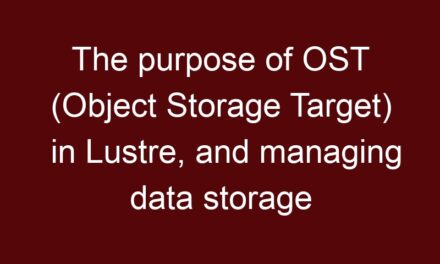ZFS (Zettabyte File System) is a modern and advanced file system developed by Sun Microsystems, now owned by Oracle. It offers a wide range of features that make it popular for various use cases, including data storage, data protection, and data management. In some cases, we may have to use ZFS as the backend format for Lustre. Most of them circle around resiliency and reliability than performance. Here are some key features of ZFS:
- Data Integrity: ZFS uses checksums to ensure data integrity. Each block of data is checksummed, and checksum errors are automatically detected and corrected if redundant copies of data are available.
- Copy-on-Write (COW): ZFS uses a copy-on-write transactional model, which means that data is never overwritten. When new data is written or modified, ZFS writes the new data to a new location, ensuring that the original data remains intact until the new write is complete.
- Snapshots: ZFS supports efficient and space-efficient snapshots. Snapshots are point-in-time copies of the file system, allowing you to roll back to previous states easily or create clones of datasets.
- Data Deduplication: ZFS can identify and eliminate duplicate data blocks, reducing storage space requirements for redundant data.
- Compression: ZFS provides built-in data compression capabilities, allowing you to compress data on the fly to save storage space without sacrificing performance.
- RAID-Z: ZFS has its own RAID implementation called RAID-Z, which provides data redundancy and data protection similar to traditional RAID levels.
- Dynamic Striping: ZFS employs dynamic striping, which means that it automatically and dynamically stripes data across multiple disks for optimal I/O performance.
- Hot Spares: ZFS allows you to designate hot spare disks that automatically replace failed disks in the storage pool.
- Data Scrubbing and Resilvering: ZFS regularly scrubs data to identify and correct silent data corruption. Resilvering is the process of rebuilding data after a disk failure.
- Data Encryption: ZFS supports native data encryption, allowing you to encrypt data at rest on a per-dataset basis.
- Data Tiering: ZFS enables automatic data tiering, allowing you to use different types of storage devices (e.g., SSDs and HDDs) within the same storage pool.
- Dynamic Storage Pool Management: ZFS offers dynamic storage pool management, allowing you to add or remove disks to expand or shrink storage pools without downtime.
- Integration with Volume Management: ZFS integrates file system and volume management into a single entity, simplifying storage administration.
- Scalability: ZFS is designed for scalability, supporting large capacities and high-performance I/O.
- Open Source: ZFS is an open-source file system, and it is available on various operating systems, including Linux and FreeBSD.
These features make ZFS a versatile and robust file system, suitable for a wide range of applications, from home NAS setups to enterprise storage environments.





